Olena Sushyi
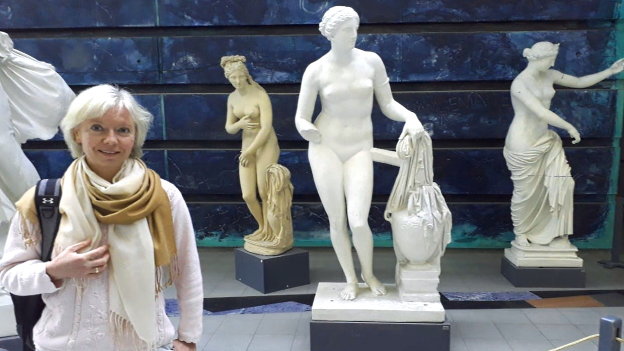 Privat
Privat
Olena Sushyi in front of the plaster casts of ancient sculptures on the campus of Friedrich Schiller University Jena
"Supported by the Scholarship “Eirene – für eine gemeinsame Zukunft” from the DAAD-Stiftung (trustee: DAAD e.V.) and the hospitality of the Department of International Relations at Friedrich Schiller University Jena, I got the opportunity to work on my research project “International Practices of Post-War Reconstruction of Communities (Political, Cultural and Psychosocial Risks)” for three months. The general aim of study was to monitor of the strategies and practices for post-conflict reconstruction and recovery of communities and to assess the risk factors for community development in the post-war period in Ukraine."
Prof. Dr. Olena Sushyi spent three months in Germany, supported by the Eirene for a Future scholarship. She analyzed the approaches to post-conflict community reconstruction.
Below she reports on her research and her life in Jena:
My main activities were aimed at reviewing the research and publications (books, thematic journals and articles, reports), identifying the current status and new trends on the issues of peacebuilding and post-conflict/post-war reconstruction, as well as testing research hypotheses.
In my search, I used the resources of the Thuringian University and State Library Jena, as well as access to such electronic databases as: JSTOR, ProQuest, APA PsycInfo, Central and Eastern European Online Library, ScienceDirect, Taylor & Francis E-Books, UNdata, United Nations Terminology Database, and others.
The selection of sources was carried out in the following thematic areas: Conflict and War Studies; Peacebuilding and Reconciliation research, Principles, Models and Approaches of Post Conflict / Post-War Reconstruction.
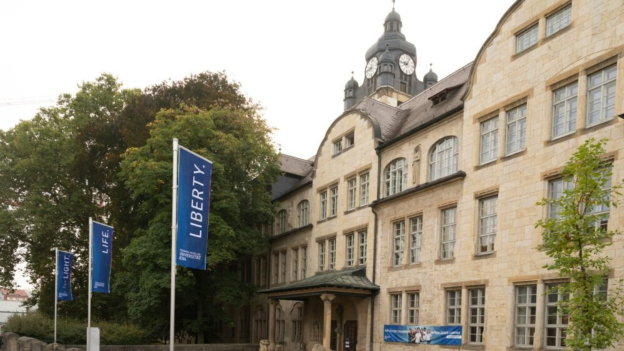
Jens Meyer Universität Jena
Flags fly at the main building of Friedrich Schiller University Jena
A fairly large array of academic publications was selected, work with which continues. In addition, special attention was paid to study of publications prepared by academics from the Department of International Relations of the Friedrich Schiller University Jena and the Jena Center for Reconciliation Studies, in particular an overview of the publication series “Innovation in Conflict Research” (Series Editor Prof. Dr. Rafael Biermann), “Research in Peace and Reconciliation” (Series Editor Prof. Dr. Martin Leiner), as well as a discussion of our current areas of research.
The review of the recent research and publications on the issues of peacebuilding and post-conflict/post-war reconstruction, with a focus on identifying the risks (political, cultural, and psychosocial) of community development in post-war period, allowed us to come to the following conclusions.
The Russo-Ukrainian war marked a deep crisis of international institutions and practices in maintaining international peace and security, capable of plunging international relations into chaos. This gives rise to disappointing forecasts regarding the viability of the international security system as a whole. With a high probability it can be argued that the world will no longer be the same as before. The outcome of the war in Ukraine will inevitably show the whole world what will become the basis of the new world order – the rule of law or the rule of force.
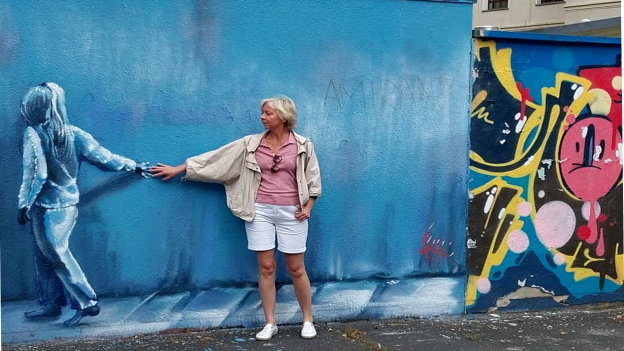
Privat
Olena Sushyi next to a lively graffiti
Processes that threaten the stability of the entire world have called into question the viability of scientific theories and approaches that set the initial foundations of values, norms and principles on which the architecture of the modern world order and international security was built (for example, the just war (justum bellum) tradition and the rules governing the justice of war (jus ad bellum), the just and fair conduct in war (jus in bello) and the responsibility and accountability of warring parties after the war (jus post bellum).
This also raises doubts about the possibilities of practical implementation of traditional approaches and principles of conflict transformation, post-conflict settlement, peacebuilding, reconciliation in current realities.
It is precisely the problems posed by the questions of the Russo-Ukrainian war and the find for ways to finish it, on the one hand, not to mention the challenges of post-war reconstruction and peacebuilding that Ukraine will have to solve in the future, on the other hand, obliges to revision and creativly rethink both classical theories and modern alternative approaches.
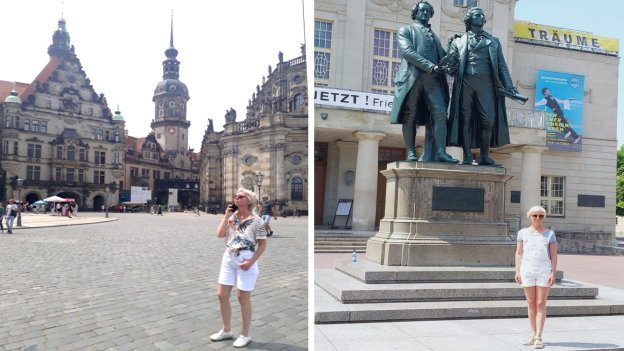
Privat
An exploratory walk through the streets of the city
Although the cases discussed in the literature are complex and unique, they demonstrate similar processes and issues that arise to varying degrees in communities emerging from armed conflict or war. It is no coincidence that when talking about countries in transition, post-war or post-conflict periods, a number of similar or related concepts are used in public and academic rhetoric, such as “post-conflict justice”, “transitional justice”, “post-conflict reconstruction”, “peacebuilding”, “reconciliation”, etc.
These terms and their definitions overlap, and their diversity reflects both the evolving nature of these ideas and links with particular institutions, protocols and procedures designed to promote post-conflict reconstruction and peacebuilding.
International protocols and instruments for conflict resolution and peace restoration, although guided by the universal imperatives of justice, peace, and democracy, do not guarantee a quick and painless transition from mass violence to a new state of peace.
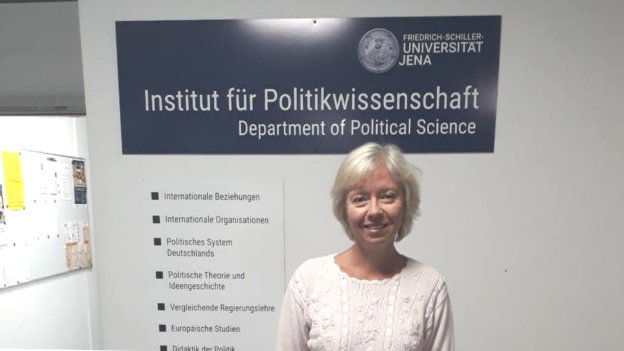
Privat
Olena Sushyi in front of the department "Institue for Political Science"
Violent conflicts are almost never fully resolved, and the cessation of hostilities, which marks the end of an armed conflict, does not always coincide with the end of the war.
Disproportionality of the scale of the Russo-Ukrainian war compared to other forms of armed confrontations that took place in the late 20th – early 21st centuries, not only demonstrates the limitations of international law in the current situation but is also likely to significantly complicate the implementation of the principles of conflict resolution and peace restoration in the future.
The desire of both theorists and practitioners to understand how and why wars start, what maintains them and prevents their completion, what are the conditions for ending wars and the forms for establishing peace, what is necessary for the transition to peace to be successful, etc. – this is not only an inexhaustible source of knowledge, allowing you to understand the essence as deeply as possible, as well as the complex and interconnected nature of such complex social phenomena as war and peace, but also evidence that humanity is still unable to take a decisive step towards eternal peace.
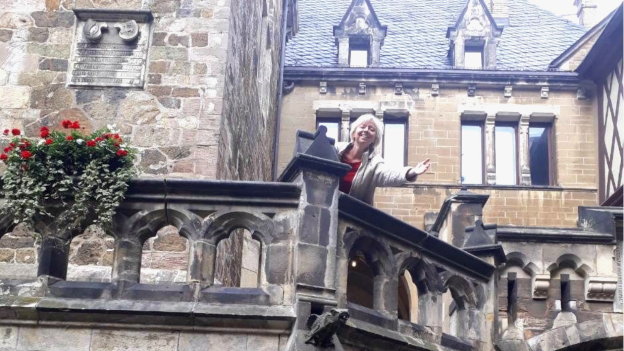
Privat
View from a historical balcony
Lessons learned from case studies reflecting trajectories of overcoming the legacy of armed conflict provide a valuable body of knowledge for understanding the problems that Ukrainian society and the state are likely to face after the end of the war. Whether this knowledge will allow us to resolve controversial issues more effectively in the extremely difficult period of post-war reconstruction and peacebuilding, time will tell.
Currently, no one can say how long will the Russo-Ukrainian war last or when it will end. Nevertheless, as I rethink the “new reality” in which Ukrainians exist for the second year in a row as a result of Russian aggression, I reflect on issues related to post-war reconstruction and peacebuilding.
How can a society that has gone through the millstones of war return to peaceful life? Is it possible to mitigate the harmful effects of war? What obstacles might arise along the way?
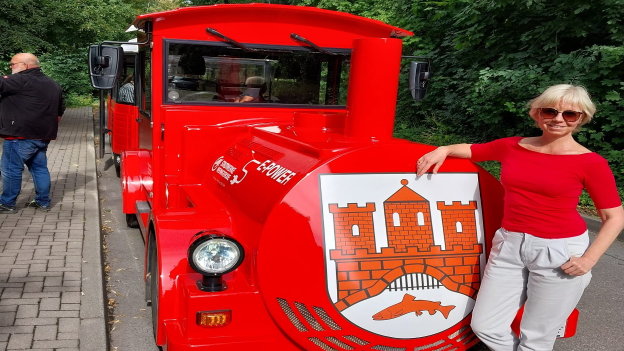
Privat
A city tour with the Wernigerode Castle Train
In the broadest sense, the processes of post-war reconstruction and peacebuilding are accompanied by many challenges and risks that generate systemic, structural, and psychological barriers to the transition from war to peace. For example:
- economic recovery, incl. interventions aimed at restoring destroyed infrastructure, revitalizing territories, and industry, ensuring, and maintaining the social and material well-being of society (risks – crises, corruption, struggle for spheres of influence and control).
- institutional changes aimed at stabilizing the social system and resuming the life cycles of its fundamental subsystems – legal, political, cultural (risks – corrosion of democratic procedures, standards and values, manipulation of public opinion, lack of trust between communities and institutions).
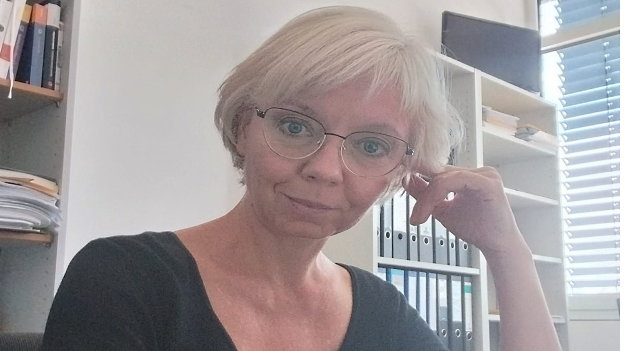
Privat
Olena Sushyi in her work environment
- administration of transitional justice, symbolizing the restoration of justice (risks – irreparable losses, disproportionate punishment to the harm caused, social tension, radicalization of social sentiment).
- psychosocial rehabilitation and restoration of a healthy socio-psychological climate, prevention and minimize relapses of intra- and intergroup conflicts (risks – mistrust, tension, radicalization, polarization, exacerbation of old and the emergence of new schisms).
- reconciliation, symbolizing acceptance, and agreement with decisions made by community institutions, even if they support a different point of view (risks – radicalization of social sentiment, increased community tensions, a breakdown in relationships between people and groups, lack of trust between communities or the institutions).
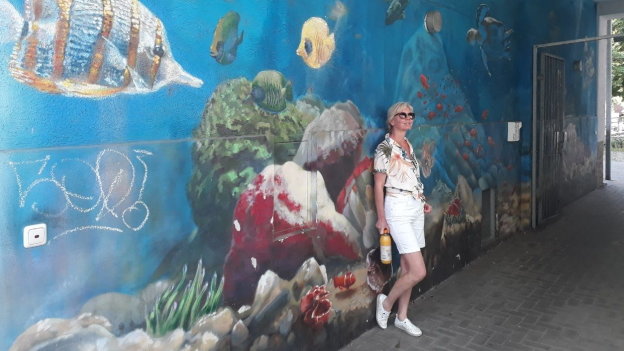
Privat
A relaxed moment in front of a colorful underwater-themed mural
- participatory foresight and partnership between the government, the private sector and civil society, as well as the concerted efforts of all stakeholders for a successful transition from mass violence to a new state of peace (risks – inconsistency and disproportion of efforts expended, available opportunities and results obtained, on the one hand, and deepening disagreements that impede the development of a common vision of the future and undermine the prospects for maintaining peace, on the other hand).
The problem that troubles my heart and that worries my thoughts is multi-complex, multi-aspect, multi-faceted. It requires a comprehensive vision of the integrity of the entire process and careful attention to its smallest details. Therefore, my research is still far from complete.
During the research stay at the Department of International Relations at Friedrich Schiller University Jena an article was prepared and accepted for publication: Sushyi, O. (2023). Intergroup interaction and post-war reconstruction of communities: new challenges, old problems. In Current problems of psychology of small groups in war and post-war period: materials of a scholar conference (Kyiv, May 16, 2023) / P. Gornostay, L. Cherna (eds). Kyiv, Talkom, 82-85.
The results of my research will used to compile an analytical report, which will present the criteria and ethical principles of expert evaluation of strategies for development of communities in the post-war period in Ukraine (in Ukrainian). I also plan to prepare an article, which will summarizing the most important results of my research, and submit it to a peer-reviewed international, multidisciplinary journal included in the Scopus or Web of Science databases (in English).
As for my personal impressions, I am very pleased to note a special vibe that reigned at the University of Jena.
It was very exciting to do my research within the walls of one of the oldest universities in Germany and observed how it celebrates life, learning, and daily activities. What is formally called a commitment to high standards of thinking and communication, and informally – a professionalism and competence, openness and responsiveness, attentiveness and delicacy, friendliness, and support – all this is actually inspires the search for knowledge and the search for truth. I would like to continue academic collaboration and developing academic partnerships with colleagues at Friedrich Schiller University Jena. I already have new, fresh ideas that I intend to discuss and which I will develop in my further research, perhaps in collaboration with my new contacts in Jena.
During my three months in Germany, I had the opportunity to relax a little and breathe a little peaceful life. Since there is a war in Ukraine, for me this is the main difference between life in Germany and life in Ukraine at the moment. This fact significantly affects the perception of the world around us because War and Peace are completely different realities. Therefore, I tried to make the most of the time allotted to me for research work, self-improvement, and knowledge of the world.
Germany is renowned for its rich history, majestic architecture and prominent figures who significantly influenced the development of European philosophy, history, and art. It was very exciting to walk along the streets where Goethe and Schiller walked in Jena and Weimer, to visit places associated with the life of Johann Sebastian Bach in Leipzig, to enjoy the scope of the art gallery in Dresden. I was truly fascinated by small towns where past and the present intersect.
The painted churches, bells calling for service and the sounds of an organ. Picturesque, cobbled streets and neat houses surrounded by flowering lawns. Where everyone can reach different parts of the city on foot and bicycles are a means of daily transportation from young to old. And, of course, the majestic castles, in which beautiful princesses once languished in captivity, on the hilltops, where the witches gathered for the Sabbath. And if you are lucky enough to attend a real German street celebration or street festival at least once, cheerful singing, games, delicious food, and drinks will quickly lift your spirits. This is exactly how – significant and comfortable, a little fabulous and peaceful – I will remember my stay in Germany in the hot summer of 2023.
The Scholarship “Eirene – für eine gemeinsame Zukunft” from the DAAD-Stiftung (trustee: DAAD e.V.) has been an important phase in my academic career. I am profoundly grateful for this opportunity, and I want to extend my heartfelt thanks once again.
As of January 2024.


